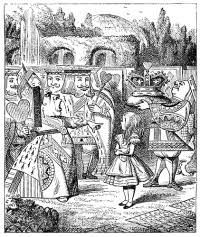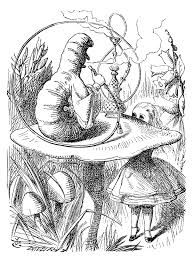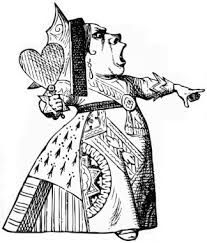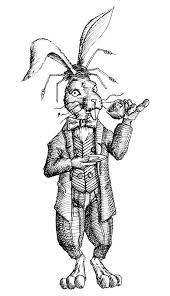Peggie vs. NHS Fife : Are we living through scenes from Alice in Wonderland?
- Administrator
- Jul 27, 2025
- 4 min read

Lewis Carroll’s Alice’s Adventures in Wonderland is a surreal exploration of a world where logic is upended, authority is questioned, and societal norms are challenged through absurdity. Spookily, it would seem that the Sandie Peggie vs. NHS Fife tribunal reveals a twenty-first century clash of perspectives, policies, and principles that mirrors the disorienting and contentious landscape of Wonderland.
The tribunal, as all those paying attention know, involves a female nurse’s objection to sharing a female changing room with a male doctor who identifies as transgender and calls himself Dr. Beth Upton. The narratives of the tribunal and of Alice’s Adventures in Wonderland, expose themes of conflicting realities, the struggle for identity, and the challenge of navigating rigid yet contradictory systems. Both narratives offer a lens through which to examine how individuals confront institutional absurdity and seek clarity in chaotic environments.

In Alice’s Adventures in Wonderland, Alice enters a world where established rules are arbitrary and fluid. She encounters the Mad Hatter’s tea party, and the Queen of Hearts’ croquet game. In these scenes, logic is subverted by nonsensical decrees.
Similarly, the Sandie Peggie tribunal highlights a clash between competing perspectives and stances. Peggie’s position is that biological sex is immutable. NHS Fife’s position is in its belief in inclusivity policies, gender ideology and that staff should be allowed to use facilities aligned with their ‘gender identity’.
Peggie’s suspension after objecting to Dr. Upton’s presence in the female changing room parallels Alice’s frustration with Wonderland’s illogical rules. The Caterpillar demands to recite poetry correctly despite her distorted memory. Both Alice and Peggie face systems that demand compliance with rules they find fundamentally misaligned with their understanding of reality. This highlights the tension between individual conviction and institutional authority and how the two interact with each other.

Identity and the concept of the self, is a central theme in both narratives. Alice constantly questions, ‘Who am I?’ as her size and perspective shifts. She struggles to maintain a coherent sense of herself in a world of contradictions. The tribunal revolves around the concept of what identity is and biological fact versus the idea of ‘gender identity’. Peggie’s claim of sexual harassment and belief discrimination under the Equality Act 2010 stems from her assertion that Dr. Upton is male and should not, therefore, access female-only spaces. Dr. Upton, identifying as a woman, represents a contrasting reality, supported by NHS Fife’s policies and by its staff, witnesses for the defence, several of whom are doctors.
The situation laid out via the tribunal mirrors Alice’s encounters with characters like the Cheshire Cat, whose enigmatic presence and ability to appear and disappear, challenge her understanding of identity and truth. The tribunal’s ruling which allows Peggie’s legal team to use male pronouns for Upton while acknowledging the distress this may cause him, reflects the Wonderland-like paradox of accommodating conflicting views and facts within a single situation.

The absurdity of the behaviour of authority figures in the tribunal and Alice in Wonderland provides similar parallels. In Wonderland, the Queen of Hearts’ arbitrary cries of, Off with their heads!’ exposes the capricious nature of power. In the tribunal, NHS Fife’s handling of the case has demonstrated an approach which appears to lack all impartiality and due diligence to appropriate processes. NHS Fife suspended Peggie; it spent over £258,000 and counting, on a legal defence. It faces accusations of withholding and manipulating documentation including emails and other documentation. This all suggests an institutional rigidity and corruption that prioritises ideology and policy over practicality, trust, integrity and fact. It is very much akin to Wonderland’s chaotic governance.

The heated exchanges between the tribunal’s legal teams, regarding beliefs and ideological views as opposed to establishing straight facts, evoke the Mad Hatter’s tea party, where arguments spiral out of control without resolution. When facts are dispensed with, both NHS Fife and Wonderland settings reveal systems that collapse under scrutiny, leaving individuals like Alice and Peggie to navigate the fallout.
Both narratives highlight the role of external observers in amplifying confusion and division. Witness the BBC’s lack of impartial coverage regarding everything to do with ‘gender identity’ and ‘transgenderism’; witness the language use of double-think and weasel words: male criminals reported repeatedly as 'she' are only one example. In Wonderland, characters like the White Rabbit and the March Hare contribute to the chaos with their erratic behaviour. In the tribunal, public and media scrutiny, amplified by social media has provided a much needed window for the public to access and form their own views about this important legislative process while also potentially fanning the flames of division.
Ultimately, Alice’s Adventures in Wonderland and the Sandie Peggie vs. NHS Fife tribunal reflect the struggle to assert individual truth against systems that enforce contradictory and unclear rules and procedures. Alice emerges from Wonderland questioning reality, while Peggie’s case, bolstered by a Supreme Court ruling defining “woman” as biological under the Equality Act, challenges NHS Fife’s and other public service’s ideologically based policies. Both narratives underscore the disorientation of confronting institutional absurdity and the courage required from brave individuals to demand clarity in a world where logic and common sense is contested.

If Lewis Carroll's story teaches us anything, it is that if we inadvertently find ourselves tumbling down a rabbit hole into confusion about the sexed body, it is possible to hold onto the truth without succumbing to madness. Those who openly question absurdities, like Sandie Peggie, can survive the ordeals of an upside down world, and emerge with more clarity about the human condition, whilst helping others to do likewise.



Comments